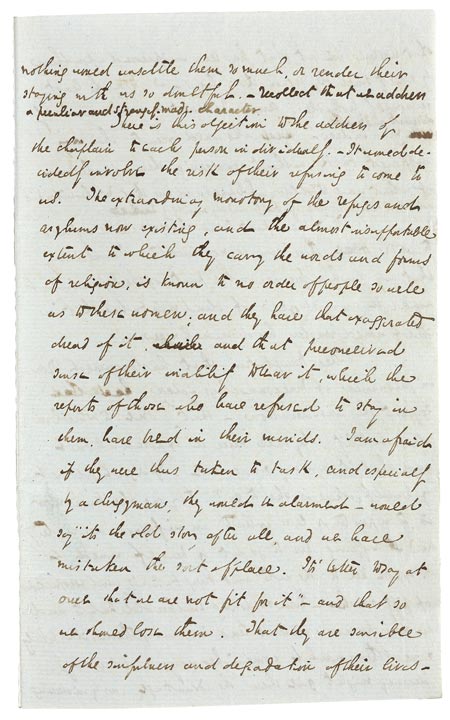
Dickens's letters to Burdett-Coutts are, by any standard, extremely long and detailed and reveal his extraordinarily competent administrative abilities as well as shrewd insight into the minds and motivations of the women who would enter Urania Cottage. He insisted "that their past lives should never be referred to." He also recognized "that these unfortunate creatures are to be tempted to virtue. They cannot be dragged, driven, or frightened." Dickens's meticulous attention to detail is apparent in this letter, in which he informs Burdett-Coutts that "I have laid in all the dresses and linen of every sort for the whole house... I have made them as cheerful in appearance as they reasonably could be—at the same time very neat and modest."
Philanthropy
From 1840 Dickens guided the charitable work of philanthropist Angela Burdett-Coutts (1814–1906), the wealthiest heiress in Victorian Britain. Dickens served as her official almoner and helped to assess the merits of the thousands of letters she received from those seeking financial assistance. He also advised on her plan for improved sanitation in the slums of Westminster and drew her attention and support to the Ragged School Union, which provided education to London's poorest children. A pragmatist, Dickens encouraged Burdett-Coutts to direct her philanthropy toward the causes of distress. In 1847 they founded a home, Urania Cottage, in Shepherd's Bush, as a shelter for homeless women—prostitutes or petty criminals who sought to rehabilitate themselves by learning practical skills and developing self-discipline. Many of the women were assisted to eventually emigrate to one of Britain's colonies to begin a new life. For more than ten years, Dickens administered Urania Cottage on behalf of Burdett-Coutts and played an extremely active role in its day-to-day management.
nothing would unsettle them so much, or render their staying with us so doubtful.—Recollect that we address a peculiar and strangely-made character.
There is this objection to the address of the chaplain to each person individually.—It would decidedly involve the risk of their refusing to come to us. The extraordinary monotony of the Refuges and Asylums now existing, and the almost insupportable extent to which they carry the words and forms of religion, is known to no order of people as well as to these women; and they have that exaggerated dread of it, and that preconceived sense of their inability to bear it, which the reports of those who have refused to stay in them, have bred in their minds. I am afraid if they were thus taken to task, and especially by a clergyman, they would be alarmed—would say "its the old story after all, and we have mistaken the sort of place. It's better to say at once that we are not fit for it"—and that so we should lose them. That they are sensible of the sinfulness and degradation of their lives—
